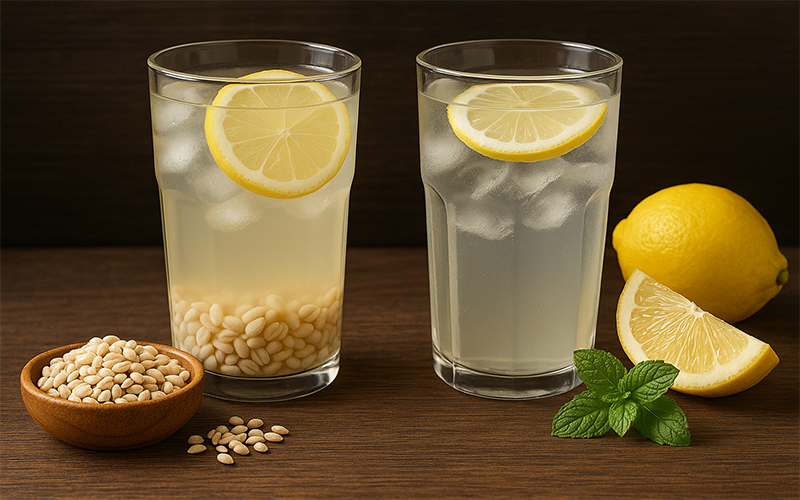In the quest for healthier beverage options, barley water vs lemon water often come up as top contenders. Both are celebrated for their potential health benefits, from aiding digestion to boosting hydration. But which one is better for you? The answer depends on your individual health goals, dietary needs, and preferences. This article dives into the nutritional profiles, health benefits, and potential drawbacks of barley water and lemon water to help you make an informed choice.
What Is Barley Water?
Barley water is a traditional beverage made by boiling barley grains in water, sometimes straining out the grains or leaving them in for added texture. Often flavored with lemon juice or a sweetener like honey, it has been consumed for centuries in various cultures, from ancient Greece to modern-day Asia, for its refreshing taste and purported health benefits. Barley, a whole grain, is packed with fiber, vitamins, and minerals, making barley water a nutrient-rich drink.
Nutritional Content of Barley Water
The exact nutritional profile of barley water varies depending on the recipe and whether the grains are strained. Generally, it contains:
- Calories: Higher than lemon water due to barley’s carbohydrate content, potentially equivalent to a light meal if unstrained.
- Fiber: A significant source of dietary fiber, especially if grains are included.
- Vitamins and Minerals: Rich in folate (a B vitamin), iron, copper, and manganese, which support cell growth and overall health.
- Antioxidants: Contains compounds like tocols and ferulic acid, which combat oxidative stress.
Note: Premade barley water may contain added sugars or preservatives, which can reduce its nutritional value. Opt for homemade versions to control ingredients.
Health Benefits of Barley Water
Barley water’s health benefits stem from its nutrient-dense profile, particularly its fiber and antioxidant content. Here are the key advantages:
1. Supports Digestive Health
Barley water is an excellent source of dietary fiber, both soluble and insoluble. Soluble fiber, like beta-glucan, feeds gut bacteria, producing short-chain fatty acids that reduce inflammation and improve gut health. Insoluble fiber adds bulk to stool, promoting regular bowel movements and preventing constipation. Research suggests that high-fiber diets may lower the risk of chronic conditions like irritable bowel syndrome and colorectal cancer.
2. Promotes Heart Health
Barley water contains tocols and beta-glucan, which have been shown to lower LDL (“bad”) cholesterol levels, reducing the risk of heart disease. Studies, such as one published in the Journal of Food and Drug Analysis, indicate that barley’s beta-glucan can suppress cholesterol and improve cardiovascular health. It may also help lower blood pressure in some individuals.
3. Aids Weight Loss
The fiber in barley water slows digestion, helping you feel fuller for longer and potentially reducing overall calorie intake. Its low fat content and hydrating properties make it a good addition to a weight-loss plan when paired with a balanced diet and exercise. A study in the Journal of Nutrition found that high-fiber foods like barley can support weight management.
4. Helps Control Blood Sugar
Barley’s soluble fiber slows sugar absorption in the bloodstream, helping to prevent blood sugar spikes. This makes barley water a potential ally for managing diabetes or prediabetes. Research published in Nutrition Research showed that barley-based meals resulted in lower blood sugar and insulin responses compared to other grains like oats.
5. May Reduce Cancer Risk
The fiber and antioxidants in barley, such as ferulic acid, may protect against certain cancers, particularly colon cancer, by promoting toxin elimination and inhibiting cancer cell growth. While more research is needed, preliminary studies suggest a protective effect.
6. Boosts Immune Function
Barley water’s vitamins and minerals, combined with its antioxidants, support immune health by fighting free radicals. When flavored with lemon, it gains a small boost of vitamin C, further enhancing immunity.
What Is Lemon Water?
Lemon water is simply water infused with the juice or slices of fresh lemons. It can be served hot or cold and is sometimes enhanced with ingredients like honey, mint, or spices. Lemons are a citrus fruit rich in vitamin C and antioxidants, making lemon water a low-calorie, refreshing beverage popular for its simplicity and health claims.
Nutritional Content of Lemon Water
A glass of lemon water (using one 48-gram lemon) typically contains:
- Calories: Approximately 10.6 calories, making it nearly calorie-free.
- Vitamin C: Provides about 21% of the daily value (DV), crucial for immune function and skin health.
- Other Nutrients: Small amounts of folate (2% DV), potassium (1% DV), and B vitamins (1% DV for B1, B2, B5).
- Antioxidants: Contains flavonoids, which combat oxidative stress.
Note: Lemon water’s nutritional value is minimal compared to whole lemons, as juicing excludes fiber-rich parts like the pith.
Health Benefits of Lemon Water
Lemon water’s benefits are primarily tied to its vitamin C content and hydrating properties. Here’s a closer look:
1. Boosts Vitamin C and Antioxidants
Lemons are a rich source of vitamin C, an antioxidant that protects cells from free radical damage, supports immune function, and aids collagen production for healthy skin. A single glass of lemon water can provide a significant portion of your daily vitamin C needs, potentially reducing the risk of chronic diseases like heart disease and cancer.
2. Enhances Hydration
Adding lemon to water makes it more palatable, encouraging increased water intake. Proper hydration is essential for regulating body temperature, supporting joint health, and removing waste. The National Institute of Diabetes and Digestive and Kidney Diseases recommends 6–8 glasses of water daily, and lemon water can help meet this goal.
3. Supports Digestion
Lemon water may stimulate gastric acid secretion and promote peristalsis (gut movement), aiding digestion. A 2022 study in European Journal of Nutrition found that drinking 300 mL of lemon water before meals improved digestion over four weeks. However, its fiber content is negligible compared to barley water.
4. May Aid Weight Loss
Lemon water is often touted for weight loss, primarily because it encourages hydration, which can reduce snacking and promote fullness. A 2018 study showed that drinking water before meals reduced food intake, but there’s no evidence that lemon water directly burns fat. Its low-calorie nature makes it a good alternative to sugary drinks.
5. Helps Prevent Kidney Stones
The citric acid in lemons increases urine citrate levels, which can prevent kidney stone formation by making urine less acidic. The National Kidney Foundation recommends mixing 4 ounces of lemon juice concentrate with water daily for those prone to kidney stones.
6. Improves Skin Health
Vitamin C in lemon water supports collagen production, which maintains skin elasticity and reduces signs of aging. Its antioxidant properties may also protect skin from oxidative damage, though direct evidence for lemon water’s skin benefits is limited.
Comparison: Barley Water vs Lemon Water
To determine which drink is better, let’s compare them across key factors:
| Aspect | Barley Water | Lemon Water |
|---|---|---|
| Calories | Higher (varies by recipe, potentially meal-equivalent if unstrained) | Low (~10.6 calories per glass with one 48g lemon) |
| Fiber | High (soluble and insoluble, supports digestion and fullness) | Negligible (no fiber from lemon juice) |
| Vitamins/Minerals | Folate, iron, copper, manganese; supports cell growth | Vitamin C (21% DV), small amounts of folate, potassium, B vitamins |
| Antioxidants | Tocols, ferulic acid; reduces oxidative stress | Flavonoids, vitamin C; protects against cell damage |
| Hydration | Hydrating, fiber may aid water retention | Highly hydrating, palatable taste encourages water intake |
| Digestive Health | Excellent due to high fiber content | Moderate, may stimulate gastric acid and peristalsis |
| Weight Loss | Promotes fullness via fiber, supports weight management | Encourages hydration, may reduce snacking, but no direct fat-burning effect |
| Heart Health | Lowers LDL cholesterol, may reduce blood pressure | May reduce oxidative stress, but less direct evidence for heart health |
| Other Benefits | Blood sugar control, potential cancer risk reduction | Kidney stone prevention, skin health support |
| Side Effects | May cause digestive issues (e.g., constipation, loose stools); contains gluten | May erode tooth enamel, cause heartburn if overconsumed |
Key Differences
- Nutritional Profile: Barley water is more nutrient-dense due to its fiber and mineral content, but it’s higher in calories. Lemon water is nearly calorie-free and excels in vitamin C delivery.
- Health Focus: Barley water is better for digestive and heart health due to its fiber and cholesterol-lowering properties. Lemon water shines for immunity and kidney stone prevention.
- Accessibility: Lemon water is easier to prepare (just squeeze a lemon into water), while barley water requires boiling and straining, which may be less convenient.
Potential Drawbacks
- Barley Water: Its high fiber content can cause digestive discomfort if consumed in excess. It also contains gluten, making it unsuitable for those with celiac disease or gluten intolerance. Premade versions may have added sugars, reducing health benefits.
- Lemon Water: Frequent consumption can erode tooth enamel due to its acidity, so using a straw and rinsing your mouth afterward is recommended. It may also trigger heartburn in some individuals due to increased gastric acid.
Which One Is Better?
The “better” choice depends on your health goals and dietary restrictions:
- For Digestive Health: Barley water is superior due to its high fiber content, which promotes regular bowel movements and gut health. However, those with gluten intolerance should avoid it.
- For Heart Health: Barley water’s cholesterol-lowering properties make it a stronger choice for cardiovascular health.
- For Immunity and Skin Health: Lemon water’s vitamin C content makes it ideal for boosting immunity and supporting skin health.
- For Kidney Stone Prevention: Lemon water is the clear winner due to its citric acid content.
- For Weight Loss: Both can help, but barley water’s fiber may provide a slight edge by promoting fullness, while lemon water’s low calories make it a good swap for sugary drinks.
- For General Hydration: Both are effective, but lemon water’s refreshing taste may encourage more frequent drinking.
If you don’t have specific health concerns, you don’t need to choose one over the other. Alternating between barley water and lemon water or even combining them (e.g., adding lemon juice to barley water) can provide a mix of benefits. For example, lemon-flavored barley water combines fiber, vitamin C, and hydration in one drink.
How to Incorporate Both Drinks
- Barley Water Recipe: Rinse 1 cup of pearl or hulled barley, soak for 4 hours, then simmer in 3–4 cups of water for 45–60 minutes. Strain (optional), cool, and add lemon juice or honey for flavor. Drink 1–2 cups daily.
- Lemon Water Recipe: Squeeze the juice of half a lemon (about 48g) into a glass of water (8 oz). Add slices for extra flavor or serve hot/cold. Drink 1–2 glasses daily, using a straw to protect teeth.
- Tips: For barley water, choose unprocessed barley and avoid sugary premade versions. For lemon water, use fresh lemons rather than bottled juice to maximize nutrients.
Conclusion
Barley water and lemon water each offer unique health benefits, making them both valuable additions to a healthy diet. Barley water stands out for its fiber-driven benefits, supporting digestion, heart health, and blood sugar control. Lemon water excels in providing vitamin C, aiding hydration, and preventing kidney stones. Your choice should align with your health priorities, whether it’s improving gut health, boosting immunity, or simply staying hydrated. By understanding their benefits and potential drawbacks, you can enjoy these drinks mindfully and even combine them for a refreshing, nutrient-packed beverage. Always consult a healthcare professional for personalized dietary advice, especially if you have medical conditions like diabetes or gluten intolerance.











[…] Read: Barley Water vs Lemon Water: Which Is Better for You? […]